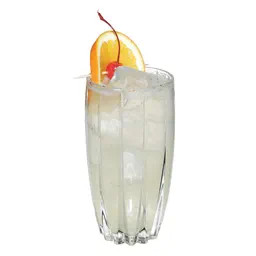The John Collins is a classic cocktail that has stood the test of time, celebrated for its refreshing blend of gin, lemon, sugar, and soda water. Often mistaken for its close relative, the Tom Collins, the John Collins boasts a rich history and a subtle distinction in its gin base. This guide delves into the John Collins Drink, exploring its origins, recipe, and the fascinating family of Collins cocktails it spawned.
Unpacking the John Collins: More Than Just a Gin and Soda
At its heart, the John Collins is a quintessential highball cocktail. It’s a simple yet sophisticated mix, perfect for warm days or as an aperitif. The key ingredients are:
- London Dry Gin: This is the defining element that differentiates a John Collins from a Tom Collins. The crisp, dry profile of London Dry Gin provides the spirituous backbone of the drink.
- Fresh Lemon Juice: The sourness of freshly squeezed lemon juice provides a crucial counterpoint to the sweetness and gin, creating a balanced and zesty flavor.
- Sugar Syrup: A touch of sweetness is essential to balance the lemon juice. Rich sugar syrup (2:1 sugar to water ratio) is often preferred for a more luxurious mouthfeel.
- Soda Water: The effervescence of soda water lengthens the drink, making it light and incredibly refreshing.
Served in a tall Collins glass, typically garnished with an orange slice and a maraschino cherry, the John Collins is as visually appealing as it is delicious.
 John Collins Cocktail with Orange Slice and Cherry Garnish
John Collins Cocktail with Orange Slice and Cherry Garnish
Crafting the Perfect John Collins: Recipe and Method
Making a John Collins at home is straightforward. Here’s a classic recipe to follow:
Ingredients:
- 60 ml (2 oz) London Dry Gin (like Hayman’s London Dry Gin)
- 25 ml (0.8 oz) Fresh Lemon Juice
- 15 ml (0.5 oz) Rich Sugar Syrup (2:1)
- 50 ml (1.7 oz) Soda Water
- Ice Cubes
- Garnish: Orange slice and Luxardo Maraschino Cherry
Instructions:
- Chill your glass: Place a Collins glass in the freezer or fill it with ice to chill while you prepare the drink.
- Shake the base: In a cocktail shaker, combine the London Dry Gin, fresh lemon juice, and rich sugar syrup. Fill the shaker with ice.
- Shake well: Shake vigorously for 15-20 seconds until the shaker is well-chilled.
- Strain into glass: Remove the ice from your chilled Collins glass and fill it with fresh ice cubes. Strain the mixture from the shaker into the glass over the ice.
- Top with soda: Top the glass with soda water, leaving a little space at the top.
- Gentle stir: Stir gently to combine the ingredients.
- Garnish and serve: Garnish with an orange slice and a Luxardo Maraschino cherry speared on a cocktail stick. Serve immediately with straws.
This recipe creates a drink that is both gentle and boozy, with a balanced sweet and sour profile, perfect for sipping on a warm afternoon.
The History of the Collins: From Gin Punch to a Cocktail Family
The Collins family of cocktails traces its roots back to the Gin Punch, a popular drink in 19th-century London. The creation of the John Collins is often attributed to, or at least named after, John Collins, a head waiter at Limmer’s Hotel in London during the late 1800s. Limmer’s Hotel was a renowned establishment, particularly favored by sporting crowds, and celebrated for its Gin Punch as early as the 1810s.
An 1892 limerick immortalized John Collins and his famous concoction:
My name is John Collins, headwaiter at Limmer’s,
Corner of Conduit Street, Hanover Square,
My chief occupation is filling brimmers
For all the young gentlemen frequenters there.
Mr. Frank always drinks my gin punch when he smokes.Charles and Frank Sheridan, 1892
It’s believed that John Collins’s renowned gin punch evolved into what we now know as the John Collins cocktail. The distinction between John and Tom Collins arose with the type of gin used. While John Collins is traditionally made with London Dry Gin, the Tom Collins utilizes Old Tom Gin, a slightly sweeter style of gin from the 19th century.
Harry Johnson’s 1882 Bartenders’ Manual provides early recipes, further solidifying the distinction:
JOHN COLLINS. (Use an extra large bar glass) 1 table-spoonful of sugar; 5 to 6 dashes of lemon juice; 1 wine glass full of Holland gin; 4 or 5 small lumps of ice; Open a bottle of plain soda water, pour this into the ingredients, mix up well, remove the ice, and serve.
TOM COLLINS (Use an extra large bar glass) Three-quarters table-spoon of sugar; 3 or 4 dashes of lime or lemon juice; 3 or 4 pieces of broken ice; 1 wine glass of Old Tom gin; 1 bottle of plain soda water; mix up well with a spoon, remove the ice, and serve.
Interestingly, Johnson’s recipe for John Collins actually specifies Holland Gin (Genever), highlighting the evolving nature of cocktail recipes over time. By the early 20th century, as evidenced in Thos. Stuart’s 1904 Stuart’s Fancy Drinks and How to Mix Them, the John Collins was associated with “gin,” generally understood to be London Dry Gin in that era, while Tom Collins remained tied to Old Tom Gin.
The Expansive Collins Family: Variations on a Theme
The John Collins has spawned a large family of “Collins” cocktails, each substituting the base spirit while maintaining the core formula of citrus, sweetener, and soda. David A. Embury, in his 1948 The Fine Art of Mixing Drinks, aptly noted the proliferation of Collins cousins:
“Originally there were two brothers only in the Collins family – Tom and John. During recent years, however, numerous cousins have appeared on the scene…“
Here are some notable members of the Collins family:
- Tom Collins: The most famous cousin, made with Old Tom Gin.
- Vodka Collins (Joe Collins): A neutral and widely popular variation using vodka.
- Whiskey Collins (Colonel Collins): Utilizes bourbon or rye whiskey for a richer flavor profile.
- Scotch Collins (Sandy/Jock Collins): Features Scotch whisky, offering a smoky and complex twist.
- Rum Collins: Typically made with light or aged rum, adding a tropical note.
- Tequila Collins (Jose/Pepito Collins): A south-of-the-border take with tequila.
- Brandy Collins (Pierre Collins): Uses cognac or brandy for a more luxurious and warming version.
- Pisco Collins: Employs pisco, a Peruvian or Chilean brandy, for a unique South American flair.
- Genever Collins (Dutch/Phil Collins): Harks back to the older recipes using genever or Dutch gin.
- Calvados Collins (Jack Collins): Features apple brandy (Calvados) for a fruity and autumnal variation.
- Irish Whiskey Collins (Ronan/Mike Collins): Made with Irish whiskey, offering a smooth and slightly malty character.
- Canadian Whisky Collins (Captain Collins): Uses Canadian whisky for a lighter and often slightly sweeter profile.
- White Rum Collins (Pedro Collins): Light white rum creates a very refreshing and clean Collins variation.
 Selection of Collins Cocktails
Selection of Collins Cocktails
This extensive list demonstrates the versatility of the Collins template and how easily it adapts to different base spirits, offering a spectrum of flavors to explore.
John Collins: Nutrition and Alcohol Content
For those mindful of their intake, a single serving of John Collins contains approximately 184 calories.
In terms of alcohol content:
- 1.7 standard drinks
- 12.12% alcohol by volume (ABV), which translates to 24.24 proof
- Approximately 18.2 grams of pure alcohol
Note: These values are approximate and can vary slightly based on ingredient proportions and specific brands used.
Conclusion: The Enduring Appeal of the John Collins
The John Collins remains a beloved classic for good reason. Its simple recipe belies a remarkably refreshing and balanced cocktail. Whether you are a gin aficionado or simply seeking a timeless and easy-to-make drink, the John Collins is a must-try. Its rich history and the fascinating family of variations it has inspired only add to its enduring appeal. Explore the world of Collins cocktails and discover your own favorite in this celebrated family!
Discover more Classic/vintage cocktails and Hall of Fame & must know/try cocktails.


